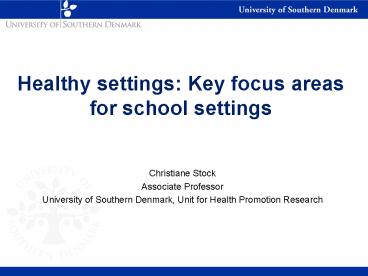Christiane Stock - PowerPoint PPT Presentation
1 / 20
Title: Christiane Stock
1
Healthy settings Key focus areas for school
settings
- Christiane Stock
- Associate Professor
- University of Southern Denmark, Unit for Health
Promotion Research
2
Presentation Outline
- Background, origins and evolution
- Overview of healthy settings concept and theory
- Connecting within and across settings
- The role of schools in reducing health
inequalities - Conclusion
3
Settings as a Dimension of the Health Promotion
Matrix
Setting
Population Group
Topic / Problem
Methods
4
Source
5
Healthy Settings What?
- A setting is also where people actively use and
shape the environment and thus create or solve
problems relating to health. Settings can
normally be identified as having physical
boundaries, a range of people with defined roles,
and an organisational structure. - Source Settings for Health WHO Health
Promotion Glossary, 1998 - Aim to address that interplay of factors and
integrate a commitment to health
within culture, structures and
routine life of settings
6
Healthy Settings Why?
- Health determined outside of health services
- Health promotion requires investment in social
systems in which people live their lives
Illness
Leisure Recreation
Health Social Care
Criminal Justice
Ottawa Charter - strategies - - processes -
Community
Work/ Economy
Education
Health
Source adapted from Grossman and Scala, 1993
7
Healthy Settings Developments
Settings-related Initiatives
Background Policy Context
- Healthy Cities Project
- Health Promoting Hospitals Project
- Safe Communities
- 1992 Health Promoting Schools Network
- Regions for Health Network
- 1994 Declaration on Occupational Health for All
- Health in Prisons Project
- Yanuca Declaration on Healthy Islands
- Health Promoting Universities Book
- Western Pacific Healthy Districts Report
- Western Pacific Healthy Marketplaces Guidance
- Health for All 2000
- Ottawa Charter
- Sundsvall Statement
- Agenda 21
- 1995 WHO Global School Health Initiative
- Jakarta Declaration
- Settings for Health in WHO Glossary
- Health 21 Target 13
- UN Education for All agreement
- WHO European Investment for Health and
Development Office - 2005 Bangkok Charter
8
Ecological Model of Health Promotion
- Health determined by interplay of environmental,
organisational and personal factors - Shift of emphasis to salutogenesis health
creation - Focus on whole populations
- Holistic perspective develop supportive
contexts in places people live their lives
9
Systems Perspective
- Settings as dynamic complex systems with inputs,
processes, outputs and impacts - Interconnectedness, interrelationships,
interdependencies and integration between
different elements - Each setting is part of a greater whole an
open system in synergistic exchange with the
wider environment, and within this, other
settings
10
Whole System - Organisation Development and
Change
- Primary focus on introduction and management of
change within the whole organisation - Applying whole system thinking
- Using organisation development and change
management approaches and techniques
11
Theory into Practice Strategies Key Focus Areas
(Baric, 1993)
- Creating supportive healthy living and working
environments
Setting
Developing links with other settings and wider
community
Integrating health into daily activities of the
setting
12
Integrating health into daily activities of the
setting
13
Creating supportive healthy living and working
environments
14
Developing links with other settings and wider
community
15
Developing links with other settings and wider
community
Macrosystem
Exosystem
Norms
Values
Mesosystem system of Microsystems
Health Services
School
Parents Workplace
Home
Clubs
Child
Social Services
Laws
Neighbourhood
Beliefs
Societal Culture Sub-Cultures
Healthy Settings adapted from Mark Dooris 2006
16
Connecting Between Actors
teachers
pupils
wider community
families
caterers
leadership
17
Connecting Between Components
inter-personal relationships
formal curriculum
transport infrastructure
leadership structures
indoor environment
school grounds
18
Connecting Between Themes
mental health
sexual health
advertising sponsorship
substance use
physical activity
food/diet
19
Interconnectedness reduces inequalities
- We are challanged to improve the health of the
poorest fastest! - Interconnectedness reduces the impact of
disadvantage - High quality schooling increases critical health
literacy
20
FOR YOUR ATTENTION! cstock_at_health.sdu.dk































